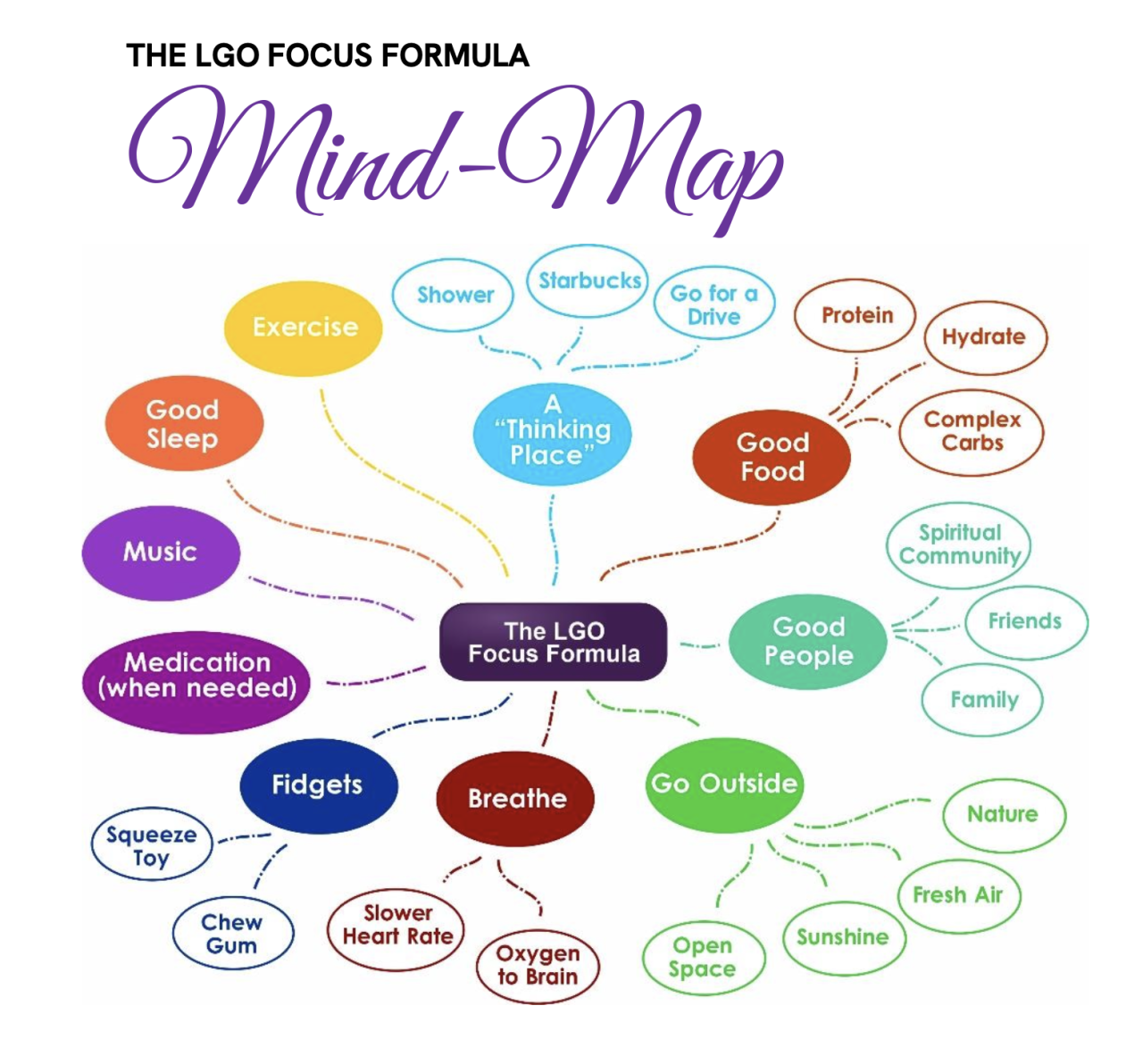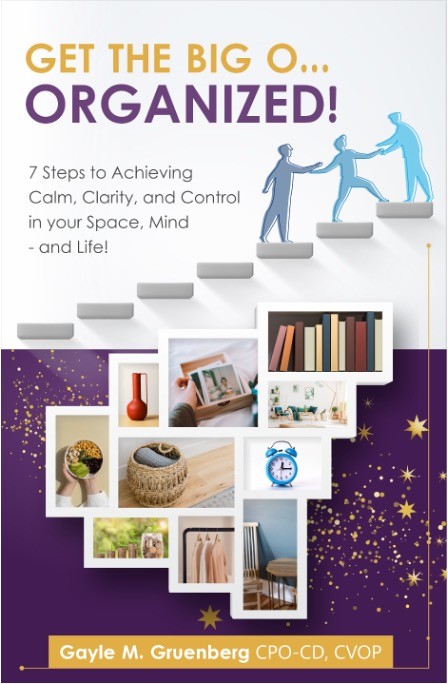Still in time for Passover: Get Organized with Gayle M. Gruenberg
When we clear out the physical and mental clutter in our lives, we create the room needed to bring in new and more desired things, people, and experiences.
Gayle is the Chief Executive Organizer of Let's Get Organized, LLC, in Northern New Jersey. She is a Certified Professional Organizer in Chronic Disorganization, Certified Virtual Organizing Professional, and an Organizer Coach. Gayle is the author of Get the Big O: Organized! 7 Steps to Achieving Calm, Clarity, and Control in Your Space, Mind - and Life! and the organizing expert with the lifestyle brand Change Your Attitude, Change Your Life.
For many Passover comes with spring cleaning, not just Passover cleaning. So what better time to speak to Gayle Gruenberg, a professional organizer coach? While many of us are already post our Pesach clean, not everyone managed to Pesach prep and get our spring cleaning done and there's always next year. We also discuss the connection between organizing and writing.
I met Gayle virtually through a Jewish women's network and I was delighted when she suggested a Zoom coffee date. Welcome Gayle Gruenberg to gilagreenwrites!
Why did you write this book?
I wrote this book as a tool for people who need and want professional organizing help but who can't afford it, who are too ashamed to let someone into their home, or who live in a part of the world underserved by professional organizers. My aim is to guide the reader through seven steps of the organizing process without judgment and with understanding of their challenges and strengths.
I want to reassure people living with Chronic Disorganization that they are not alone and to normalize that everyone struggles with something. We can't all be masters at everything. They are brilliant at what they do best, and others are here to help them with things for which they need external support.
The reader is invited to do the internal work required to delve into any underlying causes of Chronic Disorganization. This includes identifying their core values, so that they can create organizing systems that serve the way they think and want to live.
Who is your audience?
My audience can be diverse. The book is for anyone who wants to get organized but doesn't know where to start. It's for people living with brain-based conditions that contribute to Chronic Disorganization who may feel alone or isolated because of their clutter or disorganization.
Do you have any insights into how your organizing abilities helped you write the book and by extension might help other writers? i.e., is there any correlation between home organizing and organizing your writing?
I love this question! Yes, there is a correlation. Organizing is a way of thinking. Whether someone thinks in a linear or more circular way, it's still a matter of starting with a main idea and then breaking it down into smaller parts. The way I personally think does tend to be linear, and I like to process information with written words. I love lists and outlines that start with one thing and then logically move on to the next thing, which is how my book is structured. I start with Step 1 of the organizing process and then move on to Step 2, etc.
If someone thinks in a circular manner, a mind map is an excellent tool, especially if they process information in pictures. A mind map puts a main idea in the center, with supporting and sub-supporting detail branching off, sort of like a web. Notice The LGO Focus Formula, an example of a mind map I created for a client and which is included in my book.
Another aspect of organizing that comes into play when writing is categorizing, or putting like with like. When we start writing, we may have this big idea of what we want to say, so we may start with a stream of consciousness process to just get all of our thoughts out. Then we can go back and pull apart what we've written to find the commonalities, group similar ideas together, and develop them into a clear and cohesive concept. The same holds true when creating an organizing system.
Is there any way in which your Jewish background influenced this book?
Yes! My company tag line is Make Space for Blessings. I believe this is what we do when we clear out the physical and mental clutter in our lives. We create the room needed to bring in new and more desired things, people, and experiences. In my book, I note that I'm a spiritual person, and when I first shared this phrase with clients, they perked up and took notice. It resonated with them, regardless of their own spiritual or religious beliefs.
I also talk about organizing to one's core values. My spiritual journey into my own Judaism has shown me that living according to Torah values makes life easier. The rules are set and we know what we have to do. Organizing to one's core values creates boundaries. Evaluating everything in one's life according to those values and boundaries allows for easy decision-making, which can be challenging during the organizing process.
Make Space for Blessings is the name of another book I'm writing, which sees the Torah as the ultimate organizing book. I have a few chapters written already, and it's definitely a work in progress!
Is organizing really something you can learn about from reading vs doing?
I feel they need to go hand in hand. Readers can learn the concepts of organizing through the written word, but they do need to take action in order to implement them.
One of the concepts I talk about in the book is information processing modalities. Some people can in fact read, hear, or see examples of something, and then act on it. Others must touch something or move around in order to internalize it. Using multiple senses when doing anything gives a new habit a better chance of "sticking." So using all of these modalities and then physically implementing the process I take the reader through can indeed solidify a skill.
What are your plans for your next book?
I have so many ideas! One is Make Space for Blessings, as noted above. Each chapter focuses on one parshah to discuss how it relates to organizing. It's not an easy book to write; it requires time, research, contemplation, and creativity (as would any book, for sure), but it is a lot of fun!
I also have many articles on Chronic Disorganization and related topics that I've written for various publications. I want to turn them into quick-reading min-ebooks. I have two already on Amazon, one on organizing for holidays in general and one on Chronic Disorganization and Attention Deficit/Hyperactivity Disorder.
Have you had any unusual feedback or some feedback you did not expect?
It's still a bit early in the process, and I welcome all feedback. I want to make sure the book is useful to those who need it most. I can always revise what I have now into a second, updated edition that addresses anything I may have left out in the current version.
Some feedback I did expect is the reaction to the title of the book. It sounds a bit provocative, which is not an accident. The phrase "get the big O" connotes a very different type of experience! My intention is to grab a potential reader's attention, tie the O to the word "organized," and evoke the same feeling of satisfaction achieved by the original "big O."
How can busy writers keep their homes organized? A few tips...
Aside from having a place for everything and everything in its place, putting things where you use them and in the order in which you do, and having in your home only what you need/use/believe to be beautiful, one tip is to stay mindful and be present. The writing process can be completely immersive. We can so easily lose ourselves in the world we create with our words that we forget about the "real" world.
To stay organized, take a few minutes at the beginning and end of each day to "straighten up" your living environment. Before sitting down to write, make the bed, wash the dishes, pick up toys, clear your desk of extra papers, assemble a few things for an easy dinner, and/or throw in a load of laundry.
After a day of writing, take a moment to clear your head. Shut down your computer. Schedule the tasks and goals you want to accomplish the next day in your calendar (paper or electronic doesn't matter). Prepare your desk with everything you need in order to do them.
Moving around will feel really good after expending all of that brain energy. Maybe take a quick walk or do arm circles. Then refocus on your physical space. Put the laundry in the dryer (set a timer if it doesn't have one), put the next load in, and prepare a meal while everything is running. The timer will remind you to fold and put away the laundry (this is actually a huge challenge for many of my clients).
Another tip is to "batch" activities, such as doing all food prep activities on one day, setting aside a block of time to pay bills or file papers, or as above, doing all of the laundry beginning to end. Writers are likely especially good at this technique, as we tend to block out a chunk of time to write.
Anything you wish to add?
Yes. Many people say, "I don't know where to start!" My answer is to just start. It doesn't really matter where. You can start with an area that bothers you the most, is the easiest to address, is the most difficult to address, or yields an immediate visual impact. Start small, as even just a few minutes can make a big difference. It gives you a tremendous feeling of satisfaction and often motivates you to keep going and do even more.
When you subscribe to the blog, we will send you an e-mail when there are new updates on the site so you wouldn't miss them.



Comments